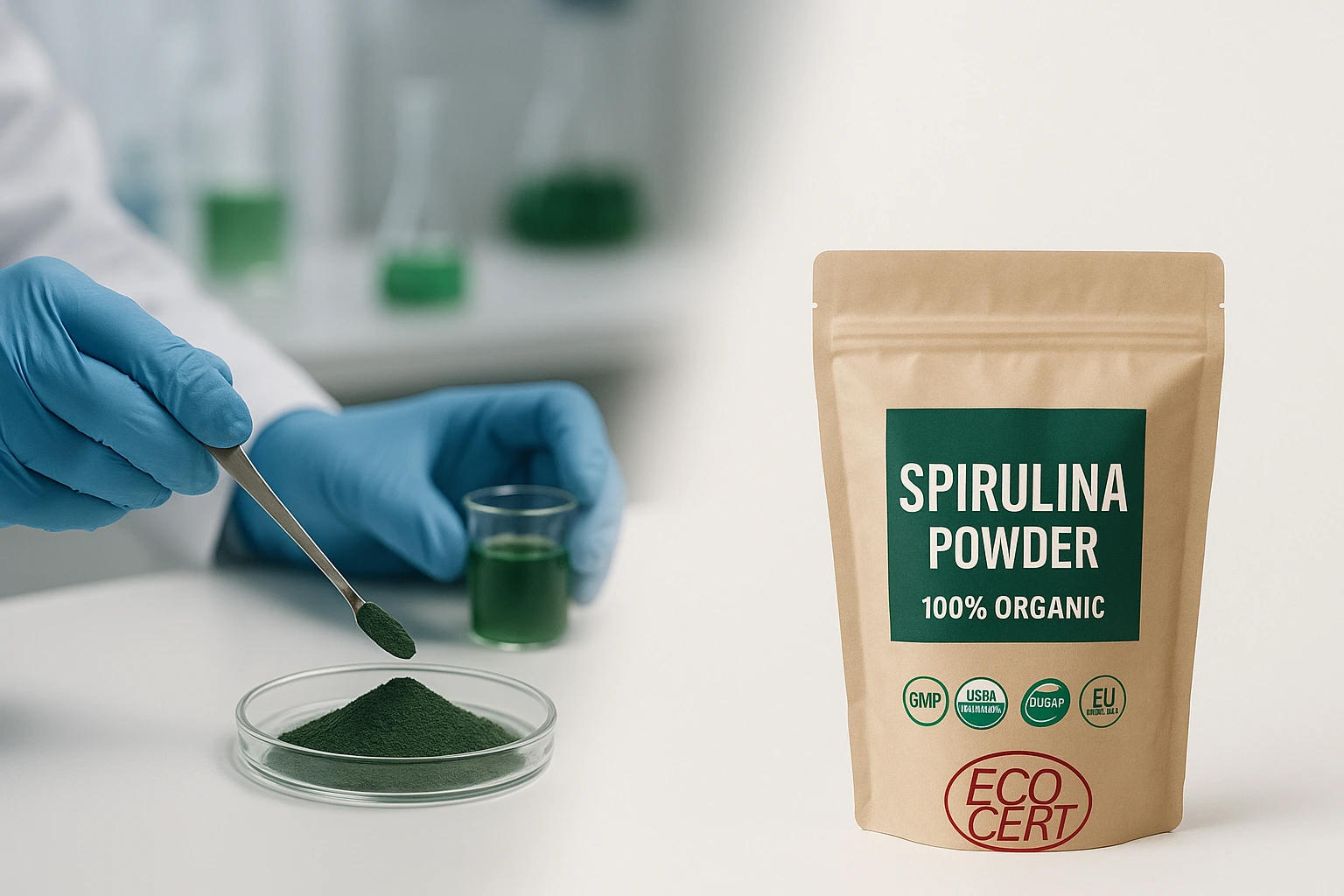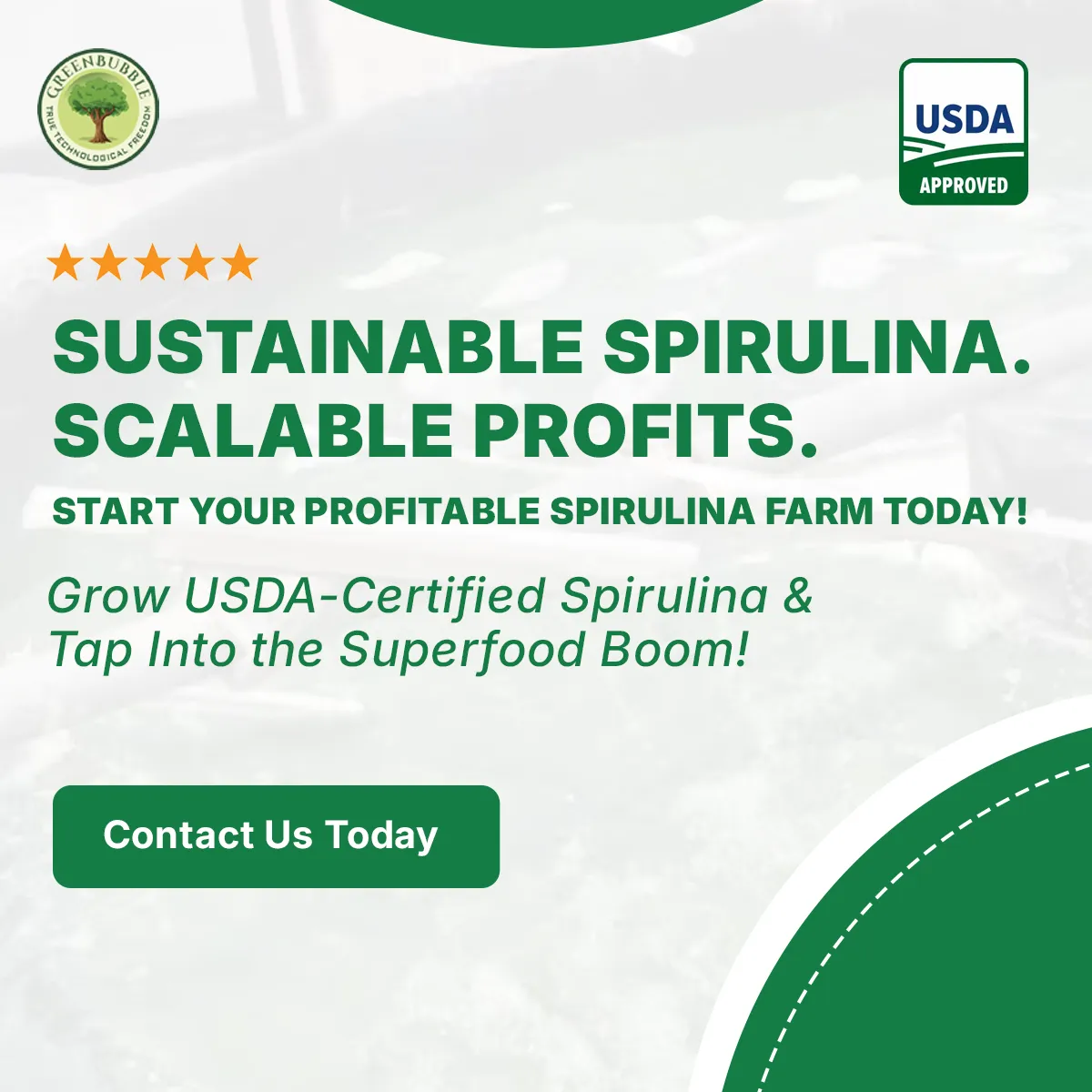Spirulina farming has become one of the most profitable farming opportunities in India and globally, thanks to the rising demand for superfoods. However, success in spirulina production goes beyond cultivation. To compete in domestic and international markets, spirulina must meet strict safety and quality standards. This requires rigorous lab testing and adherence to certifications like GMP, HACCP, and USDA Organic.
This guide explains why lab testing is essential, what certifications matter most, and how spirulina farmers can achieve them.
Why Lab Testing is Non-Negotiable in Spirulina Farming
Spirulina directly absorbs nutrients and minerals from its water medium. This makes it vulnerable to contamination from:
- Heavy metals (lead, mercury, arsenic, cadmium)
- Microbial pathogens (E. coli, Salmonella, Staphylococcus)
- Agricultural chemicals (pesticides, herbicides, fertilizers)
Without lab verification, spirulina cannot be marketed as safe for human consumption, let alone exported to global markets. Regular testing ensures:
- Consistent protein levels (55-70%)
- Safe limits of heavy metals and toxins
- Compliance with organic and food safety certifications
- Traceability for consumer trust
👉 Read more about spirulina quality control in mass production to understand testing requirements.
Key Certifications for Spirulina Producers
1. GMP (Good Manufacturing Practices)
- What it is: GMP is a system ensuring products are consistently produced and controlled according to quality standards.
- Relevance to Spirulina:
- Ensures hygienic processing, drying, and packaging.
- Prevents contamination during grinding, sieving, and packing.
- Mandates cleanroom environments and trained staff.
Steps to Get GMP Certified:
- Set up GMP-compliant infrastructure: cleanroom, stainless steel processing equipment, HEPA filters.
- Maintain detailed SOPs (Standard Operating Procedures).
- Conduct regular internal audits.
- Apply through accredited certifying bodies.
👉 Learn more about spirulina storage and packing solutions for GMP compliance.
2. HACCP (Hazard Analysis and Critical Control Points)
- What it is: A preventive system ensuring food safety by identifying hazards and implementing control measures.
- Relevance to Spirulina:
- Critical points include pond water quality, harvesting, washing, and drying.
- Helps in preventing contamination from bacteria, toxins, or foreign matter.
Steps to Get HACCP Certified:
- Identify hazards in spirulina farming (water, contamination, drying).
- Define Critical Control Points (CCPs) such as harvesting, drying, and packaging.
- Implement monitoring systems.
- Document corrective actions.
- Apply through a HACCP certification body.
3. USDA Organic Certification
- What it is: USDA Organic certifies that spirulina is grown and processed without synthetic fertilizers, pesticides, or prohibited inputs.
- Relevance to Spirulina:
- Highest market value comes from organic-certified spirulina.
- Necessary for exports to the US and other premium markets.
Requirements for USDA Organic:
- No use of synthetic chemicals in ponds.
- Organic-approved inputs for carbon, nitrogen, and phosphorus.
- Detailed record-keeping of every stage.
- Annual inspection by accredited certifiers.
👉 Learn about organic spirulina feed solutions to meet USDA Organic standards.
Testing Parameters for Spirulina
1. Nutritional Analysis
- Protein %
- Essential amino acids
- Fatty acid profile (GLA, linolenic acid)
- Vitamin and mineral content
2. Pigment Testing
- Phycocyanin %
- Chlorophyll-a %
- β-carotene levels
3. Safety Parameters
- Heavy Metals: Lead ≤ 0.20 µg/g, Mercury ≤ 0.025 µg/g
- Microbes: E. coli, Salmonella absent
- Toxins: Pesticides, Aflatoxins absent
Certification Comparison Table
| Certification | Focus Area | Relevance for Spirulina | Market Access |
| GMP | Manufacturing practices, hygiene | Ensures safe processing | Domestic + Export |
| HACCP | Hazard control, food safety | Prevents contamination | Domestic + Export |
| USDA Organic | Organic inputs, no chemicals | Required for premium export | US, EU, Global |
Investment Needed for Lab Testing & Certification
| Component | Estimated Cost (INR) |
| In-house Lab Setup | ₹8-12 Lakhs |
| Third-Party Lab Testing (per batch) | ₹20,000-50,000 |
| GMP Certification | ₹2-4 Lakhs annually |
| HACCP Certification | ₹2-3 Lakhs annually |
| USDA Organic Certification | ₹4-6 Lakhs annually |
👉 For turnkey support, explore our spirulina farming turnkey solutions.
How to Prepare for Certification Audits
- Maintain Detailed Records: Every batch must be traceable.
- Standardize Processes: From water input to drying and packaging.
- Train Staff: Certification bodies evaluate worker hygiene and SOP adherence.
- Use SS316 Equipment: Prevents contamination and supports compliance. See spirulina harvesting equipment.
- Conduct Internal Audits: Identify gaps before external audits.
Importance of Certification for Market Access
- Domestic Sales: GMP and HACCP enhance trust among buyers.
- Exports: USDA Organic is mandatory for the US and widely accepted globally.
- Price Premiums: Organic-certified spirulina can command 20-40% higher prices.
- Investor Confidence: Certification assures investors of professional standards.
👉 Read more about market trends and opportunities in spirulina farming.
Common Mistakes Farmers Make in Lab Testing and Certification
- Skipping regular heavy metal testing.
- Claiming “organic” without certification (a punishable offense).
- Using SS304 or mild steel equipment that contaminates the product.
- Poor record-keeping, leading to failed audits.
- Treating certification as a one-time process rather than continuous compliance.
Conclusion
Lab testing and certifications are the backbone of professional spirulina farming. While cultivation ensures yield, testing and certification ensure trust, safety, and profitability. Farmers who invest in GMP, HACCP, and USDA Organic certification not only safeguard their operations but also open doors to premium markets.
By maintaining rigorous water quality, standardized processing, and consistent testing, spirulina producers can compete at the highest global standards. Certification is not just about compliance-it is the gateway to scalable and sustainable spirulina business growth.


